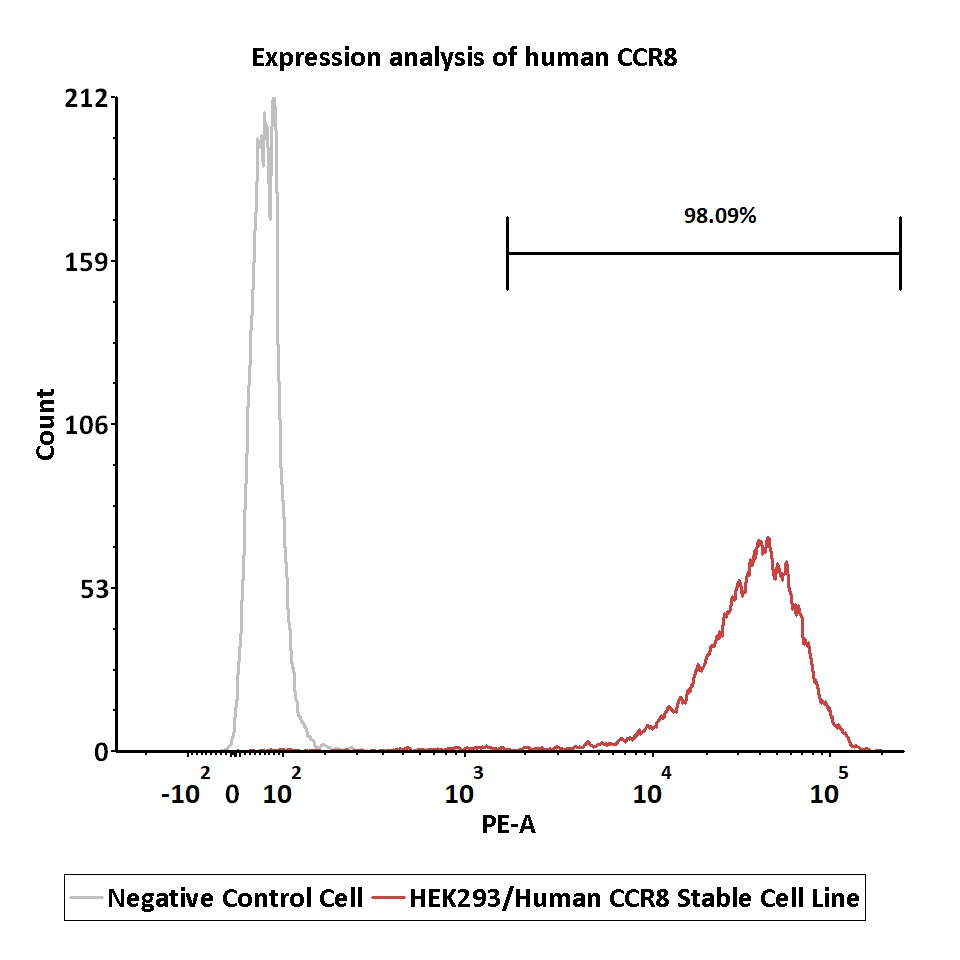- Genetically modified cell lines best reflect MOA (Mechanism of Action)
- Higher activity and larger assay window for robust and reproducible cell-based bioassay
- Comprehensive application data to support assay development and validation
- Full tracible record, stringent quality control and validated cell passage stability
- Parental cell line legally obtained from internationally recognized cell resource bank and commercially licensed
- Global commercial license assistance whenever regulatory filing is required
描述(Description)
The HEK293/Human CCR8 Stable Cell Line was engineered to express full length human CCR8 (Gene ID: 1237), used to mimic cancer target cells. Surface expression of human CCR8 was confirmed by flow cytometry.
应用说明(Application)
• Useful for cell-based CCR8 binding assay
生长特性(Growth Properties)
Adherent
筛选标记(Selection Marker)
Hygromycin B (20 μg/mL)
培养基(Complete Growth Medium)
DMEM + 10% FBS
冻存液(Freeze Medium)
Serum-free cell cryopreservation medium
装量(Quantity)
1 vial contains at least 5×10^6 cells in 1 mL serum-free cryopreservation medium
存储(Storage)
Frozen in liquid nitrogen.
支原体检测(Mycoplasma Testing)
Negative
无菌检测(Sterility Testing)
Negative
使用说明(Instructions for Use)
See data sheet for detailed culturing and assay protocol.
Receptor Assay

Expression analysis of human CCR8 on HEK293/Human CCR8 Stable Cell Line by FACS.
Cell surface staining was performed on HEK293/Human CCR8 Stable Cell Line or negative control cell using anti-human CCR8 antibody followed by staining with PE anti-human IgG antibody.
Protocol
如有相关细胞池需求请联系我们
背景(Background)
This entry represents CC chemokine receptor 8 (CCR8), which it is expressed predominantly in lymphoid tissues and has also been found in glomerular podocytes and human umbilical vein endothelial cells (HUVECs). CCR8 is associated with Th2 lymphocytes, which are critical for allergy, and has a role in lymphocyte activation, migration, proliferation and differentiation and in allergic diseases. CCR8 binds to CCL1 (also known as I-309) and to CCL16 (also known as liver expressed chemokine). It also exhibits a high affinity for three chemokines of viral origin: vMIP-I, vMIP-II and vMCC-I.
Limited Use&License Disclosure
BY USE OF THIS PRODUCT, RESEARCHER AGREES TO BE BOUND BY THE FOLLOWING TERMS OF LIMITED USE OF THIS CELL LINE PRODUCT.
- If the researcher is not willing to accept the terms of limited use of this cell line product, and the product is unused, ACRO will accept return of the unused product.
- Researchers may use this product for research use only, no commercial use is allowed. "Commercial use" means any and all uses of this product and derivatives by a party for profit or other consideration and may include but is not limited to use in: (1) product manufacture; and (2) to provide a service, information or data; and/or resale of the product or its derivatives, whether or not such product or derivatives are resold for use in research.
- This cell line is neither intended for any animal or human therapeutic purposes nor for any direct human in vivo use . You have no right to share, modify, transfer, distribute, sell, sublicense, or otherwise make the cell line available for use to other researchers, laboratories, research institutions, hospitals, universities, or service organizations.
- ACROBIOSYSTEMS MAKES NO WARRANTIES OR REPRESENTATIONS OF ANY KIND, EITHER EXPRESSED OR IMPLIED, WITH RESPECT TO THE SUITABILITY OF THE CELL LINE FOR ANY PARTICULAR USE.
- ACROBIOSYSTEMS ACCEPTS NO LIABILITY IN CONNECTION WITH THE HANDLING OR USE OF THE CELL LINE.
- Modifications of the cell line, transfer to a third party, or commercial use of the cell line may require a separate license and additional fees. Please contact order.cn@acrobiosystems.com for further details.























































 膜杰作
膜杰作 Star Staining
Star Staining











